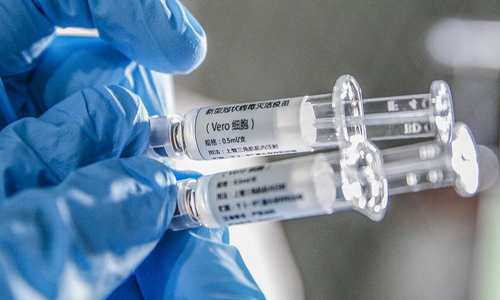Successful vaccines against coronavirus as early as March 2021: Chinese experts
By Liu Caiyu Source:Global Times Published: 2020/5/16 18:14:11

A staff member displays samples of the COVID-19 inactivated vaccine at Sinovac Biotech Ltd., in Beijing, capital of China, March 16, 2020. (Xinhua/Zhang Yuwei)
A successful vaccine against the coronavirus can be administered to humans as early as March in 2021, and difficulties of vaccines research and development are beyond people's imagination, Chinese experts said, urging the US to let its defense down and stop irresponsible actions.
As Chinese researchers are working round the clock to accelerate vaccine development, some US politicians are jeopardizing bilateral and scientific cooperation by hurling irrational words, playing the blame game, and smearing China, experts warned, noting that the "surprising" political comments of the Trump administration like "cutting off ties" may also pose threats to the research and development of vaccines.
After the US President Donald Trump's pledge claiming coronavirus vaccine could be available by the end of the year, Zhang Wenhong, a Shanghai-based infectious disease expert, made relatively prudent comments - vaccine is available as soon as possible in March 2021.
"There are uncertainties in developing vaccines. Coronaviruses, including MERS and SARS, have not seen a particularly reliable one so far… the best scenario is that if one of the vaccines that people are making is effective and progressing relatively fast, it should be available as soon as possible from March to June next year," Zhang said.
Zhang added that currently, there are 108 vaccine candidates registered under the WHO, which are in the process of development, and unregistered vaccine candidates exceed 200. If the first batch is invalid, another batch might be put on the agenda, so the timeline for a successful vaccine may come out from June to September in 2021 or even the end of 2021.
A Beijing-based immunology expert, who requested anonymity, told the Global Times on Saturday that people are overly optimistic about the availability of a vaccine against the coronavirus, which in reality is much more complicated than SARS. A vaccine is effective only when it can prevent people from contracting the virus infection.
Despite the urgency in developing vaccines, politicians in the US continue to make surprisingly irresponsible comments and play blame games, which harm bilateral scientific researches. "Words of politics are jittering US scientists and generate a sense of hesitation on cooperating with Chinese researchers," the immunology expert said.
Rumors cannot defeat the virus; smearing cannot overcome the pandemic, Chinese Foreign Ministry said Thursday after the FBI released an announcement claiming that China is stealing US information regarding the research on COVID-19 drugs, vaccines, and treatment.
This outbreak is not something any organization can face independently, and only cooperation can better combat the pandemic, said George Q.Daley from Harvard Medical School, who is part of a US-China joint research team. China's top respiratory expert Zhong Nanshan is also a part of this team.
Since its inception in February, the team has been conducting regular weekly video seminars, besides they have activated 92 scientific research so far in fields of coronavirus tests, pathogenesis, clinical trials and vaccine development, news site thepaper.cn reported.
Not only the US but Germany, France and all other countries should take off guards and work together in the face of the virus that threats everyone, Chinese experts noted, adding that it is of utmost urgency to develop an effective vaccine as all countries in the world still have meager antibody rates.
Zhang refuted the herd immunity approach that has been adopted by some Western countries, saying not a single country in the world has a high rate of antibodies, and relying on herd immunity to recover from epidemic-hit recessions is unreliable.
Less than one percent of the population in China have antibodies, so vaccines are still a top priority, He Jianxing, the head of Guangzhou Institute of Respiratory Health, said on Saturday to thepaper.cn.
Five vaccine candidates, including four inactivated candidates, have been approved by China's State Food and Drug Administration for clinical trials, which so far reported no major adverse reactions. If all goes well, the aforementioned candidates will complete Phase II clinical trials in July, Zeng Yixin, a deputy director of the National Health Commission (NHC), said on Friday during a press conference.
More candidates are to be approved by the NHC for clinical trials from June, Zeng revealed.
At an event on Friday, Trump said the US is eyeing for the vaccines by the end of the year or maybe even earlier.
Posted in: SOCIETY